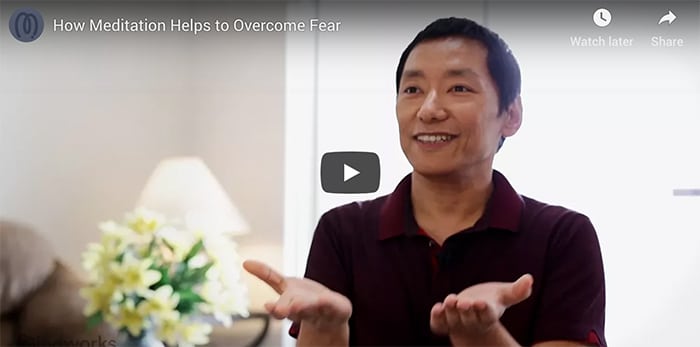What is Spiritual Meditation?
Category: Buddhist Meditation | Popular | Types of Meditation

At its core, spiritual meditation is the mindful practice of connection to something that is greater, vaster, and deeper than the individual self. It may seem paradoxical, but the path to that connection passes through honest self-reflection. While there are many meditation techniques that look to increase spiritual awareness, they all require an attitude of integrity and authenticity when looking at ourselves and how we view the world. Different religions practice meditation in different ways. Mindful practice isn’t limited to any particular faith or religion – anyone can follow a guided spiritual meditation. The blessings of spiritual meditation have a ripple effect: as our awareness and spiritual confidence increase, so do our desire and ability to be of benefit to others.
For as long as we humans have been embarking on spiritual journeys, we’ve relied on the guidance of spiritual teachers. The hallmarks of a genuine spiritual teacher are wisdom, kindness, spiritual power, and humility. Self-styled gurus who toot their own “spiritual enlightenment” horns tend to be misguided and easily lead others astray, whether their intentions are good or not.
The journey to spiritual awareness through meditation takes time. Progress is definitely not achieved overnight; promises of a quick fix are implausible at best. It takes plenty of discipline and practice to achieve spiritual realization, but the long-term benefits are incomparable. For those whose spiritual lives are important to them, there is no more worthy effort.
Can I get spiritual power through meditation?
Some people mistakenly believe that the point of practicing spiritual meditation is to achieve “superpowers” such as telepathy, the ability to heal oneself and others, knowledge of past lives, visions of the future, levitation, and so on. There’s bound to be a snake-oil guru out there who will promise them almost anything they can imagine, as long as they sign on the dotted line.
The allure of fantastical spiritual powers can overshadow the simple beauty of spiritual meditation practice. Spiritual awareness starts with being honest and kind, and with our commitment to becoming the best human being we can be. A strong desire for magic and miracles makes it very difficult to recognize and appreciate the marvel of being alive and everything that goes into making this possible. What could be more miraculous and magical than the air we breathe, the sunshine we enjoy, simple acts of kindness and compassion, interconnectedness, and everyday blessings of all kinds? Gentle appreciation of the present moment and an attitude of benevolence towards all living beings are the real fruits of spiritual awakening.
Keys to a successful spiritual meditation
The first step is really getting to know yourself. Chances are, you’re going to zero in on features that you’d like to change about yourself – like just about everyone else who commits to self-knowledge. With spiritual meditation, acknowledging and accepting who you are is the first step to truly making friends with yourself. The meditation master Pema Chödrön expresses this beautifully in her book Start Where You Are: “It is unconditional compassion for ourselves that leads naturally to unconditional compassion for others. If we are willing to stand fully in our own shoes and never give up on ourselves, then we will be able to put ourselves in the shoes of others and never give up on them.” Accepting who we are makes it possible for us to accept others as they are. When we connect with what is sacred in ourselves and others, “giving up” is no longer an option.
So you can stop worrying about having spiritual experiences in meditation, getting spiritual power, and achieving “spiritual enlightenment.” What a relief! Instead, here are some tips to help you get real and work on yourself:
- Release any grudges you’ve been holding
It can be extremely difficult to forgive some who has hurt you or someone you care about. But as your spiritual meditation practice becomes established, you’ll realize that holding on to grudges causes you nothing but pain and does nothing to help others either. The sooner you forgive, the quicker you can release this pain and move on. Don’t let a refusal to forgive hamper your journey to spiritual awareness. You can train your mind to let go by practicing mindfulness and wishing for others’ happiness. It may take time, but letting go is the obvious antidote to holding on to the pain of resentment.
- Focus your spiritual aspirations on others
True spirituality focuses on benefitting others, but to do this we have to start with ourselves first. Looking at our own minds, we learn to accept who we are with tenderness and benevolence. We can then extend this tenderness and benevolence to others. As we continue our spiritual practice, we see that the more we focus on the benefit of others, the less we tend to worry about our own desires and frustrations. We begin to realize that we are all just trying to be happy; we are all just trying our best to avoid pain. In this sense, we are all the same.
As the Dalaï Lama says, “I often joke that if you really want to be selfish, you should be very altruistic! You should take good care of others, be concerned for their welfare, help them, serve them, make more friends, make more smiles…” It may seem contradictory, but we can clearly see that the more energy we devote to others, the happier we become.
- Bring mindfulness into your faith
Many people find that practicing their faith is a great comfort and an excellent way to feed their spirit. They find a source of well-being in their meditation center or place of worship, or simply by practicing with other like-minded people. And when religious practices maintain the core spiritual foundations of kindness, openness, and connection, they can lead to experiences of spiritual awakening that transcend the mundane.
On the other hand, some people use their faith to escape from life rather than to embrace it, warts and all. By incorporating mindfulness into your spiritual practice, you remain open to the connection and blessings of the present moment. Your faith sustains you in the here and now, and your mindfulness sustains your faith.
- Open your mind to new possibilities
While we are all different in many ways, all living creatures are connected by certain universal needs and experiences. From the smallest insect to the mightiest ruler, we all look to secure well-being and avoid suffering. Besides, none of us could possibly exist without others. Guided spiritual meditation can open us to the truth of our interconnectedness and help us relativize our individual importance. There’s great freedom in accepting that we’re just a small but necessary part of the greater picture, a speck of cosmic dust in the universe, or just a grain of sand as some say. Rather than remaining stuck in self-importance, we can open our minds to all the possibilities that this freedom presents us with. We can embrace change right now and move forward into greater spiritual awareness. And we can do so without leaving our seat with the best free online meditation instruction class.
- Be authentic
The oft-repeated phrase “be yourself” encourages you to stop pretending you’re someone or something you’re not for the sake of pleasing others or covering up your shortcomings. Sadly, many people have grown so accustomed to leading make-believe lives that they don’t have a clue how to be authentic, that is, to simply be themselves. If the person you are at home is different from who you are at work or with friends, then you might want to look more closely at that behavior to see if it contributes to your well-being and that of others, or not. Embracing authenticity is being honest, transparent, and full of integrity. The clarity and openness fostered by meditation practice are precious allies on the path to true authenticity. Authenticity also avoids the dual traps of spiritual bypassing and spiritual materialism.
An interesting way to look at a spiritual system is to understand the basic structure of its philosophy, for example the four seals of Buddhism.
Along with the physical and mental benefits of mindfulness, spiritual meditation can lead to a healthy, rich inner life.
Watch this short video below by Trungram Gyalwa on how compassion and caring for others overcomes our own fear derived from self-centeredness. For further insights from Trungram Gyalwa, check out his blog post on Top 10 Best Tips on How to Meditate.







